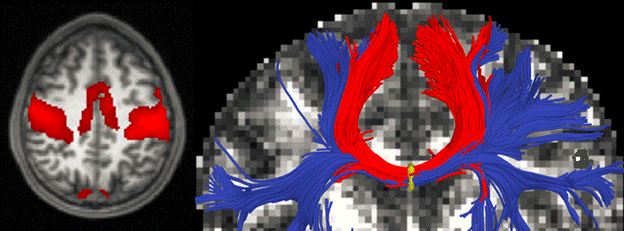unemployment and IT
The future of work in America September 4, 2012 [image: 800px-Cubicle_land]Technology and the Web are destroying far more jobs than they create. We will need to develop a “Third Way” based on community rather than the Market or the State to adapt to this reality, novelist and economic commentator Charles Hugh Smith writes on Business Insider. “The Internet is destroying vast income streams that once …more…
Wireless power system
Wireless power system replaces batteries in implants A breakthrough for miniaturizing implanted devices September 5, 2012 Wireless power transmission to a device in the human heart. Red indicates greatest power; blue is least. (Credit: John Ho, Stanford Engineering) Stanford University engineers have demonstrated the feasibility of a super-small, implantable cardiac device that gets its power from radio waves transmitted from a small transmitter on the surface of the body. This is an impressive achievement that may lead to replacing bulky batteries in implants. That means the implant... mais »
‘cyber war’ on cancer’s ‘social networking’
Experts declare ‘cyber war’ on cancer’s ‘social networking’ Researchers at Rice, Tel Aviv and Johns Hopkins universities aim to break cancer’s command-and-control codes September 5, 2012 *[+]*[image: cyber_war_on_cancer] Social bacteria: this colony of bacteria contains pioneer cells that pave the way for colony expansion in the same way that specialized cancer cells prepare for metastasis.(credit: Eshel Ben-Jacob/Tel Aviv University) In the face of mounting evidence that cancer cells communicate, cooperate and even engage in collective decision-making, biophysicists and cancer resear... mais »
A virus that kills cancer
A virus that kills cancer: the cure that’s waiting in the coldSeptember 5, 2012 *[+]*[image: oncolytic_virus] Oncolytic viral therapy uses genetically-modified viruses to destroy cancer tumors (credit: NBCI) Professor Magnus Essand has developed a virus that may kill cancer cells, *The Telegraph reports.* Cheap to produce, the virus is exquisitely precise, with only mild, flu-like side-effects in humans. But Ad5[CgA-E1A-miR122]PTD is never going to be tested to see if it might also save humans, due to lack of funding. Contact info. *Topics:* Biomed/Longevity | Biotech
Sem título
Mapping neurological disease MIT-developed algorithm extracts information from two different types of magnetic resonance imaging (MRI) scans September 6, 2012 *[+]*[image: mit_mapping_neurological_disease] Left: A functional magnetic resonance imaging (MRI) scan with cortical regions strongly correlated with motor activity highlighted in red. Right: A diffusion MRI scan with white-matter bundles passing through the corpus callosum shown in blue and red. (Credit: Marek Kubicki, Brigham and Womens’ Hospital, Harvard Medical School) MIT researchers have developed an algorithm that can an... mais »
Online schooling
Online schooling is exploding in USSeptember 6, 2012 (Credit: iStockphoto) A small but rapidly growing number of families are turning to the Internet as an alternative to chronically under-resourced brick and mortar institutions, *New Scientist*reports. Proponents say online primary and secondary education, whether full-time or as part of a “blended” program of online and face-to-face education, could usher in a new era of personalizing education that will give each child the best chance of success. According to the Evergreen Education Group, an educational consultancy based in Duran... mais »
Green tea
Brainy beverage: study reveals how green tea boosts brain cell production to aid memorySeptember 7, 2012 *[+]* Green tea leaves steeping in a gaiwan 盖碗 (credit: Wikimol/Wikimedia Commons) It has long been believed that drinking green tea is good for the memory. Now Chinese researchers have discovered how the chemical properties of China’s favorite drink affect the generation of brain cells, providing benefits for memory and spatial learning. The researchers, led by Professor Yun Bai from the Third Military Medical University, Chongqing, China, focused on the organic chemical EGCG (ep... mais »
Where in the CNS.
"Heads Up" -- The Discovery Files [image: The Discovery Files][image: Audio] Play AudioThe Discovery Files podcast is available through iTunes or you can add the RSS feedto your podcast receiver.Princeton University researchers have found a mysterious region deep in the human brain could be where we sort through the onslaught of stimuli from the outside world and focus on the information most important to our behavior and survival.Credit: *NSF/Karson Productions* *Audio Transcript:* On a need-to-know basis I'm Bob Karson with the discovery files--new advances in science and engineer... mais »
Healthcare System Waste
Healthcare System Wasted $750 Billion in 2009, IOM Says Robert Lowes September 6, 2012 — An inefficient, extraordinarily complex, and slow-to-change US healthcare system wasted more than $750 billion in 2009, according to a new studyfrom the Institute of Medicine (IOM) that calls for a drastic overhaul. Excessive administrative costs on the part of insurers explain some of those squandered dollars, but unnecessary and inefficiently delivered services on the part of physicians, hospitals, and other providers account for the lion's share of the $750 billion, said the report, which was ... mais »
Organic?
The Organic Fable Cristóbal Schmal By ROGER COHENPublished: September 6, 2012 3 Comments LONDON — At some point — perhaps it was gazing at a Le Pain Quotidien menu offering an “organic baker’s basket served with organic butter, organic jam and organic spread” as well as seasonally organic orange juice — I found I just could not stomach the “O” word or what it stood for any longer. Organic has long since become an ideology, the romantic back-to-nature obsession of an upper middle class able to afford it and oblivious, in their affluent narcissism, to the challenge of feeding a planet w... mais »
Business of Health Care
*Sellected by the AMICOR Maria Ines Reinert Azambuja*What Business Are We In? The Emergence of Health as the Business of Health Care David A. Asch, M.D., M.B.A., and Kevin G. Volpp, M.D., Ph.D. N Engl J Med 2012; 367:888-889September 6, 2012 Comments open through September 12, 2012 ArticleReferencesComments (13) On January 19, 2012, after 131 years of operation, the Eastman Kodak Company filed for Chapter 11 protection in U.S. bankruptcy court. No doubt some people were surprised by this filing, because they grew up at a time when bright yellow boxes of film accompanied every family v... mais »
No Junk DNA
Bits of Mystery DNA, Far From ‘Junk,’ Play Crucial Role By GINA KOLATA Published: September 5, 201GRAPHIC: Rethinking ‘Junk’ DNA Rethinking ‘Junk’ DNA A large group of scientists has found that so-called junk DNA, which makes up most of the human genome, does much more than previously thought. Related Article » DISEASE REGULATION JUNK DNA GENES Errors or mutations in genetic switches can disrupt the network and lead to a range of diseases. The new findings will spur further research and may lead to new drugs and treatments. The many genetic regulators seem to be arranged in a complex a... mais »
Rain Forest fungi, K+, CO2, Clauds
How Fungi Create the Amazon’s Clouds By VERONIQUE GREENWOOD | September 5, 2012 ADALBERTO RIOS LANZ/SEXTO SOL Mist and clouds above the Amazon are formed in part by the vegetation below en you mess with the Amazon rainforest you mess with a lot of things — 2.5 million species of insects, 40,000 species of plants, 1,300 species of birds, and those are only the known ones. The 1.4 billion of acres of thriving, sprawling biology that cover the Amazon help drive the very metabolism of a continent. And now it appears that the rainforest is at least partly responsible for something else: th... mais »
NGC 5033
Uma galáxia de braços abertos Os braços espirais da galáxia são muito abertos, o que é comum. Mas os externos são surpreendentemente grandes, e se estendem por mais de 100 mil anos-luz. O tamanho é semelhante aos braços da Via Láctea, que também é uma galáxia em espiral.A galáxia NGC 5033 tem braços gigantescos, que podemos observar com ricos detalhes nesse fantástico retrato telescópico. Ela está localizada a cerca de 40 milhões de anos-luz da Terra, na constelação de Canes Venatici, os Cães de Caça, no hemisfério celestial norte./.../
Eat your way to dementia
Food for thought: Eat your way to dementia - 03 September 2012 by *Bijal Trivedi* - Magazine issue 2880. *Subscribe and save* - For similar stories, visit the *Food and Drink* , *Mental Health* and *The Human Brain* Topic Guides *Read full article* Continue reading page *|1 |2 |3 |4* *Sugar junkies take note: a calorific diet isn't just bad for your body, it may also trigger Alzheimer's disease* *Editorial:* "Brain diabetes: the ultimate food scare" SUZANNE DE LA MONTE's rats were disoriented and confused. Navigating their way around a circular water maze - a common mem... mais »
Mortality
Why We Die [Interactive] With global life expectancy rising, many causes of death are dropping off. What still fells us? By Katherine Harmon | September 4, 2012 | 5 - Share - Email A baby born in the U.S. this year is likely to live to blow out 78 birthday candles—a far longer average life span than someone born even in the 1960s. Heart disease is still the biggest killer but it, along with fatal infectious diseases and infant mortality have all fallen to much lower levels in the past half century. Researchers are now hard at work tackling the growing afflictions, such as ... mais »
Orion Nebula
*Orion Nebula: The Hubble View * *Image Credit: *NASA, ESA, M. Robberto (STScI/ESA) et al.*Explanation: *Few cosmic vistas excite the imagination like the Orion Nebula. Also known as M42, the nebula's glowing gas surrounds hot young stars at the edge of an immense interstellar molecular cloud only 1,500 light-years away. The Orion Nebula offers one of the best opportunities to study how stars are born partly because it is the nearest large star-forming region, but also because the nebula's energetic stars have blown away obscuring gas and dust clouds that would otherwise block our v... mais »
Want to Live Longer? Don’t Try Caloric Restriction The latest research on caloric restrictions shows that near-starvation diets may not be the Fountain of Youth By MAIA SZALAVITZ | @maiasz | August 29, 2012 Decades ago, in the 1930s, researchers working with lab rats made an interesting discovery. Animals that had been deprived of food seemed to live longer than rodents that were fed to satisfaction, raising the intriguing idea that maybe near-starvation was a good, rather than bad thing, for health. Follow up studies, particularly in yeast, confirmed the trend and some forward-thin... mais »
Saúde urbana e desenvolvimento
Observatório das Metrópoles: Saúde urbana e desenvolvimento *Artigo no Estadão de Hoje pela AMICOR Maria Inês Reinert Azambuja* Qual a extensão do adoecimento na nossa população? A sociedade brasileira tem pensado e falado pouco sobre a questão, mas não é difícil intuir que a saúde seja tão importante quanto a escolaridade quando se trata das sustentabilidades econômica e social de um projeto de desenvolvimento nacional. A população brasileira habitando cidades passou de 19 milhões para 146 milhões de habitantes entre 1950 e 2000, ou seja, aumentou mais de 7 vezes em apenas 50 anos.... mais »
Revista DERC
[image: CAPA - Rev DERC. 2012-18-3 - julho, agosto, setembro de 2012.jpg]*Por gentileza do Dr. Salvador Serra:* *CAPA - Rev DERC. 2012-18-3 - julho, agosto, setembro de 2012.jpg* 363K Visualizar Compartilhar Baixar [image: Rev DERC. 2012-18-3-65-96 - julho, agosto, setembro - sem a capa.pdf]*Rev DERC. 2012-18-3-65-96 - julho, a















No comments:
Post a Comment